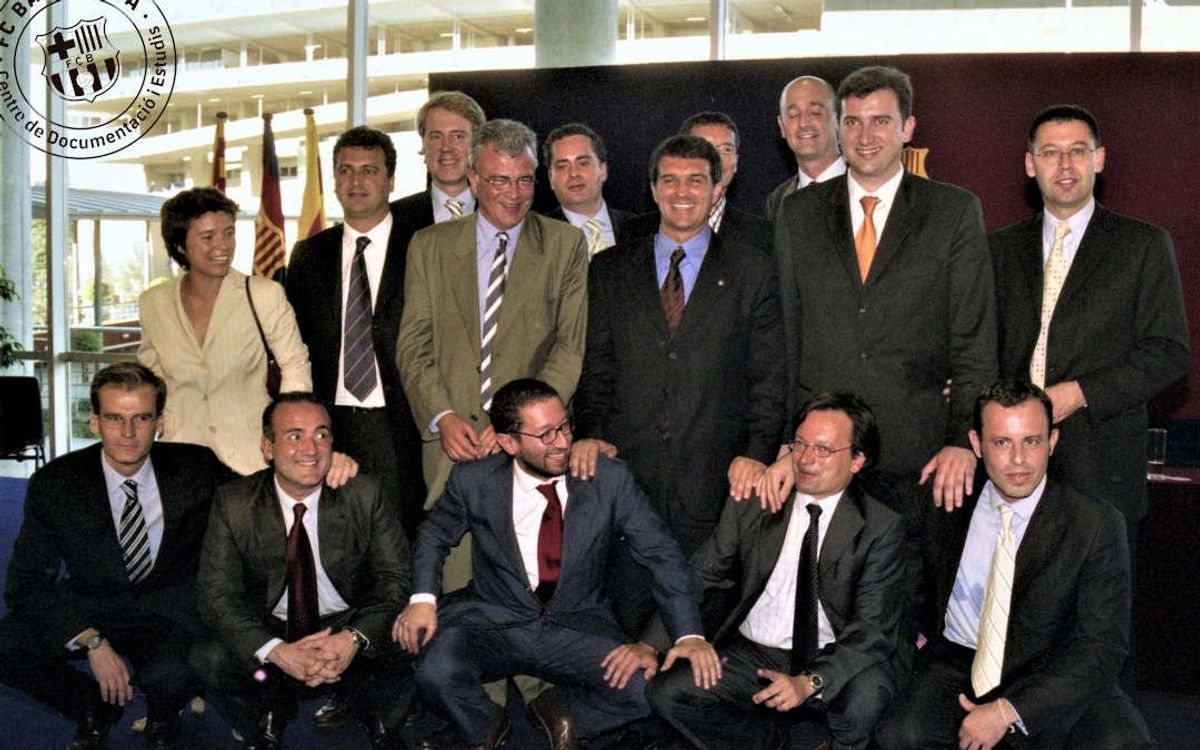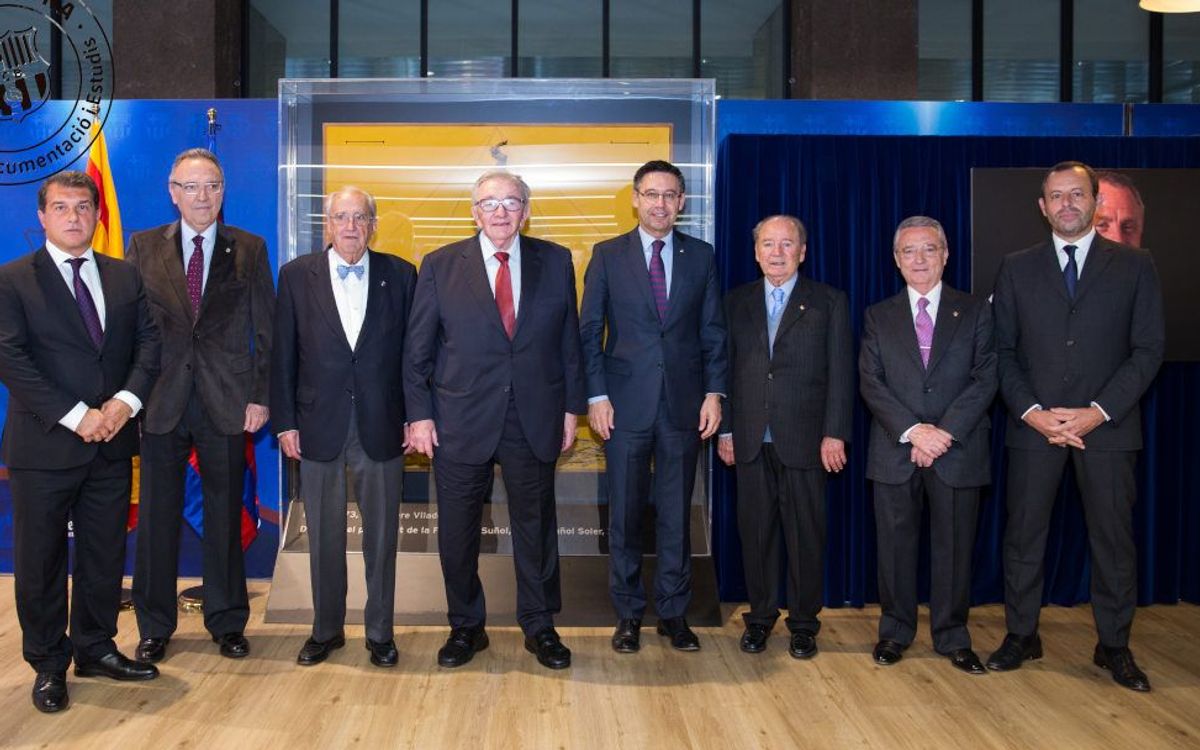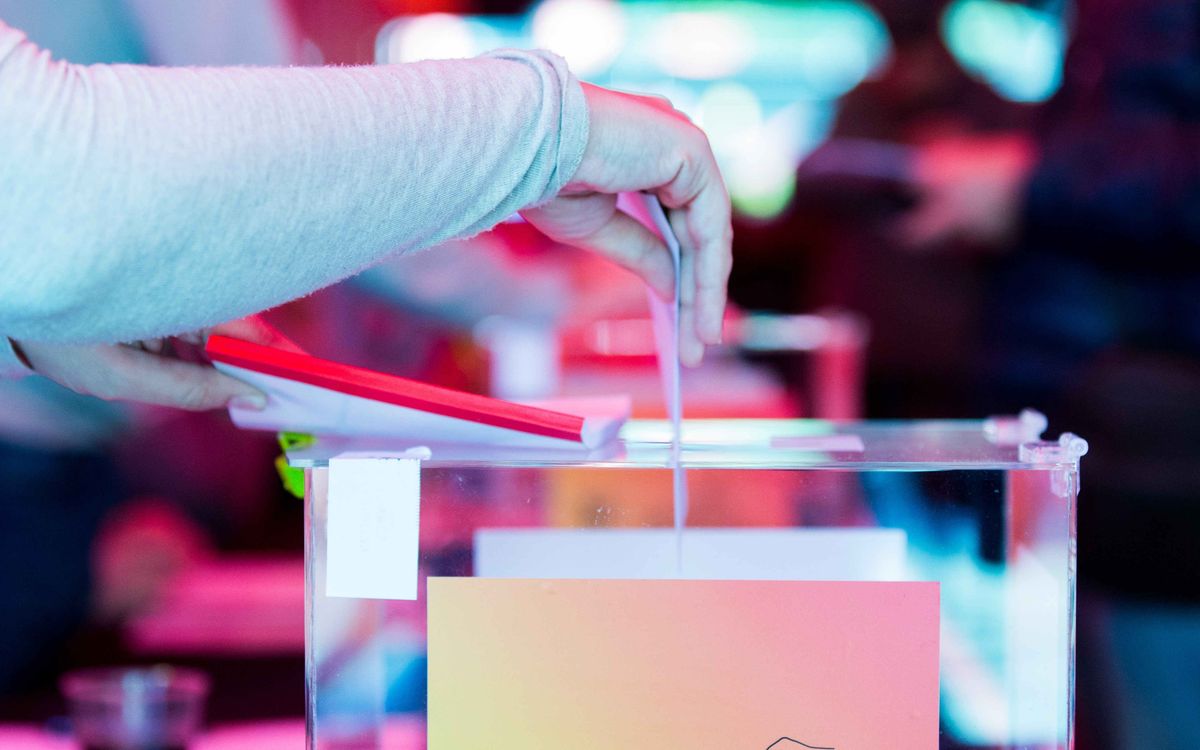FC Barcelona in the 21st century (2003-2021)
- label.aria.viber Viber
- label.aria.whatsapp WhatsApp
- label.aria.twitter Twitter
- label.aria.facebook Facebook
- label.aria.messenger Messenger
- label.aria.link label.aria.tick Copy link
After the brief caretaker presidency of Enric Reyna, who took over from Joan Gaspart, and a spell when a managing commission under Joan Trayter took control of the reins at the Club, the FC Barcelona members returned to the polls on 15 June 2003.
At the elections there were six candidates, a record at the Club; Joan Laporta, Lluís Bassat, Jaume Llauradó, Josep Martínez Rovira, Josep Maria Minguella and Jordi Majó.
The electoral campaign was dominated in the most part by the Club’s on the field performance. As such, the majority of candidates announced pre-agreements with well-known players to catch the attention of the voters. From an institutional perspective, all the candidates were in agreement that a profound change was needed in terms of how the Club had been run over the previous two decades. The two favourites in the polls, Lluís Bassat and Joan Laporta, represented opposing views on how to go about that change. Bassat embodied a more moderate approach whilst Laporta opted for a more generational, radical change.
Lluís Bassat Coen was an executive from the world of advertising who had already stood as a candidate in the elections of 2000. A man of great standing within the Catalan business community, he brought Josep Guardiola as technical secretary to help create a new, successful team. Amongst his proposals were a change in the model for the FC Barcelona Foundation which would a more relevant and influential role in the Club’s business and financial decisions.
Joan Laporta i Estruch was a lawyer from Barcelona who had previously been involved with the Club as part of the Elefant Blau platform which led the censure vote in 1998. Two years later he formed part of Bassat’s candidacy which lost the elections to Joan Gaspart. This time, in 2003, he stood himself as a candidate promising to dedicate to Barça “the best years of our lives”. His message was a markedly Catalan one that appealed to the younger voters amongst members.
The Miniestadi was the venue for the 120 electoral tables and ballot boxes. Election day passed in a festive atmosphere without incident and a total of 51,618 members exercised their right to vote. The turnout was 54.7%, the highest ever in the Club’s history. Laporta claimed victory with 27,318 votes to Bassat’s 16,412. The rest of the candidate were all way behind and on 22 June 2003 Joan Laporta and his board assumed the presidency.

The president and the board who took over on 22 June 2003. ES CAT-AFCB 03927 © FC Barcelona / Autor: Horacio Seguí.
After three seasons of on the field success with league titles in 2005 and 2006 and a Champions League victory in 2006, the growth of the Club’s fanbase and its return to financial stability but with the resignation also of five members from the initial board of directors, something unprecedented occurred. The courts decided that the first eight days of the presidency represented an entire season and for that reason elections needed to be called in 2006 and not 2007 as the board had expected.
The FC Barcelona statutes in force at the time, those from 2001, stated the following in article 29: “The Board’s term […] will have a natural duration of four years, that will begin on 1 July and end on 30 June. When a new Board takes over due to the early ending of a previous term […] the new Board will begin their term when they take over the presidency, whatever the moment in which it occurs, and it will end its term on 20 June of the fourth year.”
In August 2005 the Catalan Sports Council published a favourable report on the Board of Directors view of the matter but recommended a review of the article in question in the Club statutes. Later on, in January 2006, and following a legal case brought by a member, the Catalan Sports Tribunal decided to shelve the case and not take any disciplinary action against the Board Members. However, on 19 July, a civil court passed down a final verdict which set the board’s term as expiring on 30 June 2006.
Faced with this situation, the Board of Directors resigned en masse and the Club passed into the hands of a managing commission led by the president of the Economic Stature Commission, Xavier Sala i Martín. Elections were set for 3 September but circumstances saw on the candidacy of Joan Laporta receive the necessary number of signatures. As such, on 22 August 2006, the electoral process was brough to an end and Joan Laporta returned to the FC Barcelona presidency.
After two seasons without any major trophies and rumbling of discontent from certain quarters of the Club’s fanbase about how the organisation was being run, two members presented a censure vote that gained enough support to be carried out. Therefore, on 6 July 2008 the members went to the polls on the question of whether the current board should continue or not. According to the Club’s statutes, the motion needed more than 66.6% support to be carried through and force the resignation of the board of directors. That did not happen as the vote received 39,389 votes in favour, some 60.6%, lower than the figure required. Despite technically surviving the censure vote, 8 board members resigned after the results were announced and Joan Laporta was forced to restructure his board.
On 19 August 2009, the Ordinary General Assembly approved a series of modifications to the Club’s statutes, some of them with particular importance with regards to the governing of the institution. On the one hand, due to legal obligations, terms would now be six calendar years instead of four, and on the other if a Board were to resign, the new governing body would have a term of six years plus whatever time may pass between assuming the presidency and the following 1 July. The new statutes approved stated in article 31: “The Board’s term is simultaneous for all members and has a duration of six calendar years […] When the board is new due to the early departure of the previous term, […] the new board will begin their term the moment they take charge […] In this case, the duration of the term will be six complete calendar years plus the time from the day the board takes over until 1 July following that day.”
On a sporting level, 2009 is considered still today as the best year in FC Barcelona history. The treble achieved in the 2008/09 season of La Liga, the Copa del Rey and the Champions League was followed by more trophies thanks to that previous success with the Spanish Super Cup, the European Super Cup and the FIFA Club World Cup all conquered. The sextet of trophies rounded off a historic 2009, the year in which the Club also celebrated its 110th anniversary.
he electoral cycle rolled around again and, in the summer of 2010, more elections were held. The date chosen was 13 June and this time, after two terms as president, the statutes prevented Joan Laporta from running again. The continuity candidate from the board of directors was Jaume Ferrer, a former vice president to Joan Laporta. The others candidates who received the necessary backing to stand were Sandro Rosell, Agustí Benedito and Marc Ingla. One thing they all had in common was that, with varying degrees of responsibility, they had all formed part of the candidacy which claimed electoral victory in 2003.
This time voting took place at Camp Nou with the stadium converted into a space with all kinds of activities on election day for the members who turned up to vote. The results were more than conclusive; Sandro Rosell became the most voted for president in the Club’s history with 35,021, some 61.35% of the votes cast. The rest of the candidates came some way back with Benedito on 8,044, Ingla 7,014 and Ferrer on 6,168.
Sandro Rosell i Feliu was the son of Jaume Rosell I Sanuy who had been director general at FC Barcelona during the Agustí Montal I Costa and Raimon Carrasco’s second term in office. He was a Barcelona businessman who had been sporting vice president in the board that won the elections in 2003 but he had resigned alongside four other directors due to differences with the president. On the whole, his candidacy was based on maintaining the successful sporting model, focusing on youth development, bringing the Club closer to its fans, creating an Espai Barça with a refurbished Camp Nou and a reduction in the Club’s debts.
During Rosell’s term there was another modification to the Club’s statutes, the most significant made to that point and they were passed by the Ordinary General Assembly on 5 October 2013. Amongst the changes relating to the management of the organisation, the most important were: the legal requirement to raise from 5% to 15% the number of signatures to bring about a censure vote, the requirement to have been a member for at least 10 years to be elected president and five years to be a director and the removal of the board if a financial year with losses is not cleared within two years should it surpass a net debt of double the EBITDA.
With regards to the censure vote, the new text specified in article 55.2 reads: “A censure vote may be called if 15% of members meets the conditions in article 41 to be electors. To calculate the 15% of members the total number of members with the right to vote on the day the censure vote is called will be calculated.”
On 23 January 2014 Sandro Rosell resigned as president of FC Barcelona. He did so in a press conference in which he outlined the reasons for his decision which were the personal suffering he was enduring due to the threats and attacks on his family caused by the media storm brought about by the Neymar affair. In the press conference he was accompanied by one of his vice presidents, Josep Maria Bartomeu, who would go on to take charge at the Club.
Josep Maria Bartomeu i Floreta was a Barcelona businessman who had formed part of the victorious candidacy in 2003. Between 2003 and 2005 he was the director in charge of basketball but in June of that year he presented his resignation together with another four directors due to differences with the president. In 2010 he returned to the Club with president Sandro Rosell as he was named sporting vice president.
With Josep Maria Bartomeu as president FC Barcelona held just the fifth referendum of members in the Club’s long history. On 5 April 2014, the Club consulted members on the subject of the proposal to refurbish Camp Nou, the Espai Barça and the Palau Blaugrana. Some 37,535 members took part with 27,161 voting in favour of the board’s plan, 9,589 against and 751 NOTA. As such, the Club was given the green light for its project to radically transform Camp Nou and its surroundings.
Despite the initial desire to see out the full term until 2016, president Bartomeu decided to bring forward elections with an announcement on 8 January 2015. The aim was to bring stability to the sports’ teams and alleviate some of the external tension surrounding the club according to the president. Elections were set for 18 July.
With elections brought forward, the Board of Directors were obliged to resign as set out in the statutes and on 9 Jume a managing commission was set up to oversee the elections. On that occasions, as set out in the statutes, Ramón Adell, president of the Statute Economic Commission, was placed at the head of the management commission.
The candidates that decided to stand were Josep Maria Bartomeu, Joan Laporta, Agustí Benedito and Toni Freixa. Of the four, the first two were the favourites. Bartomeu capitalised on the on-field success for the football first team as they had recently completed the treble of league, Copa del Rey and Champions League. Laporta could point to his experiences at the head of the Club and had the unconditional support of a large sections of the blaugrana fanbase.
On election day, 44,270 members voted, some 43.12% per cent of eligible voters. The final count revealed a comprehensive win for Josep Maria Bartomeu who saw his presidency ratified at the polls. The winner received 25,823 votes, Joan Laporta 15,615, Benedito 3,386 and Toni Freixa 1,750.

All the living FC Barcelona presidents paying tribute to Johan Cruyff who passed away on 2 April 2016. © FC Barcelona / Autor: German Parga.
During Bartomeu’s presidency, and as part of the Club’s Strategic Plan 2015-21, put together by the Board of Directors, important objectives were reached such as the professionalisation of the women’s football team, the opening of an office in New York and projects such as Barça Innovation Hub, Barça Studios and the opening of the Johan Cruyff Stadium.
At the start of the 2020/21 season the president put a date to elections which had to be held between 15 March and 15 June 2021 according to the statutes. The date chosen was 20 and 21 March, two days to allow for members to vote safely in the midst of the Covid-19 pandemic and to increase turnout. Nevertheless, disappointing results on the field and unrest and discontent with the board amongst fans led a group of members to launch a censure vote which received 19,390 signatures of supports, enough to force a vote.
Faced with the impossibility of delaying further the vote beyond the limits set out in the statutes and the guarantees needed to hold the voting in secure and safe manner due to the ongoing coronavirus public health crisis, Josep Maria Bartomeu announced his resignation and that of his board on 27 October 2020.
A managing commission led by Carles Tusquets was given the job of overseeing the arrangements for the elections. Currently, the elections have had to be postponed once due to the coronavirus pandemic as they were originally set for 24 January. The new date was set as 7 March 2021 and for the first time in FC Barcelona history postal voting has been allowed as has decentralised voting with six voting locations; Barcelona, Girona, Tarragona, Tortosa, Lleida and Andorra. The candidates to become the next FC Barcelona president are Joan Laporta, Victor Font and Toni Freixa.
- label.aria.viber Viber
- label.aria.whatsapp WhatsApp
- label.aria.twitter Twitter
- label.aria.facebook Facebook
- label.aria.messenger Messenger
- label.aria.link label.aria.tick Copy link

